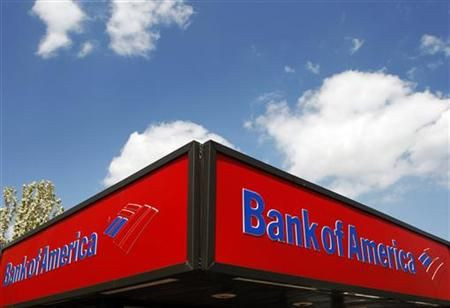Bank of America (NYSE:BAC) is the Stock That Just Won't Die
OPINION

Bank of America (NYSE:BAC) is the stock that just won't die, the inflatable bop clown of Wall Street that always seems to come right back up with a silly grin, no matter how hard the market hits it.
It seemed like it was only yesterday (perhaps because it actually was only three days ago, on Tuesday), when the shares of the banking giant teetered precariously above the $5 mark, a few cents off the dreaded "4 handle." Many were looking for the shares to hit that price, predicting the catastrophic sell-off yet to come as institutional buy-and-hold shareholders finally said "Uncle!" and dumped the bank.
Fast-forward to today and Bank of America is trading at $5.74 per share, a jump of 13.66 percent in slightly over 60 hours. The move is killing short-sellers who bet against the stock, many of whom piled up in the last month: the short interest in Bank of America's stock, or the amount of shares short sellers will eventually have to buy back, went up 25.9 percent in the first two weeks of November to 2.4 percent of the total float.
It wasn't just the vagaries of the market either. Yes, Bank of America went up significantly Wednesday, as did the shares of other major financial corporations, when a global coordinated effort by the world's top central bankers flooded liquidity into the market. Yes, banks are soaring again today, presumably on a speech from Chancellor of Germany Angela Merkel and highly encouraging employment data that's driving the wider market up.
But what about Thursday? The wider set of financial stocks were down, taken down a notch as the "hangover" from the previous day's session muted the market. And then there was also the small matter of the major lawsuit against the country's top four lenders by the attorney-general of Massachusetts. All this somehow saw Bank of America finishing the day UP, yes, UP 1.65 percent.
Part of the reason Bank of America has fared much better than pundits expected is that bad news against the bank almost always get magnified within a storyline that sees the institution as unworthy of its peers.
In the common narrative, where Wall Street is something akin to the court of a 17th-century Italian prince, Goldman Sachs is that Machiavellian figure standing to the right of the sovereign, a master of the cloak-and-dagger arts that should never be underestimated. JPMorgan is the elder statesman, executing his influence with the same firmness, if less perceived ruthlessness, than Goldman.
There are the foreign dignitaries: Credit Suisse, UBS, Deutsche Bank, HSBC. There are the clever minor lords, nimbly but effectively ruling their smaller fiefdoms: Lazard, Jefferies and the like. And of course, there are those who've been invited to court not by noble birth, but to demonstrate to the others assembled the latest technological development or academic discovery they've achieved: the high-frequency traders, the hedge funds, the private equity managers and so on.
In this tale, Bank of America is like the wealthy former fishmonger who happens to have married into royalty, though only after having financially rescued a distressed duchess (Merrill Lynch). But the fishmonger is still the fishmonger: lowborn, loud, ugly, ungraceful, with a wife everyone knows is cheating on him.
Which is why everyone seems to have dismissed the investment of Warren Buffett in the company earlier this summer as nothing more than a pricey endorsement, bought and paid for. Which is why it was so easy for everyone to pile on when the bank clumsily introduced, and then withdrew, a $5 fee on debit card use. Which is why there was a bit of schadenfreude, even glee, when the company announced plans to lay off a stunning 30,000 employees "over the next few years."
Each of these instances pushed Bank of America stock further and further down. But there is a natural bottom somewhere down there, a price at which it will take much more than hype for the stock to keep tanking.
It is commonly said that securities are sold under the ancient Roman law belief of "caveat emptor," or "buyer beware." The seller is not responsible if the actual good being sold later turns out to be of much lesser value than the agreed-upon price. For Bank of America shares, a new concept might be worth visiting: "Caveat mutuaritus venditor." Short seller beware.
© Copyright IBTimes 2025. All rights reserved.





















